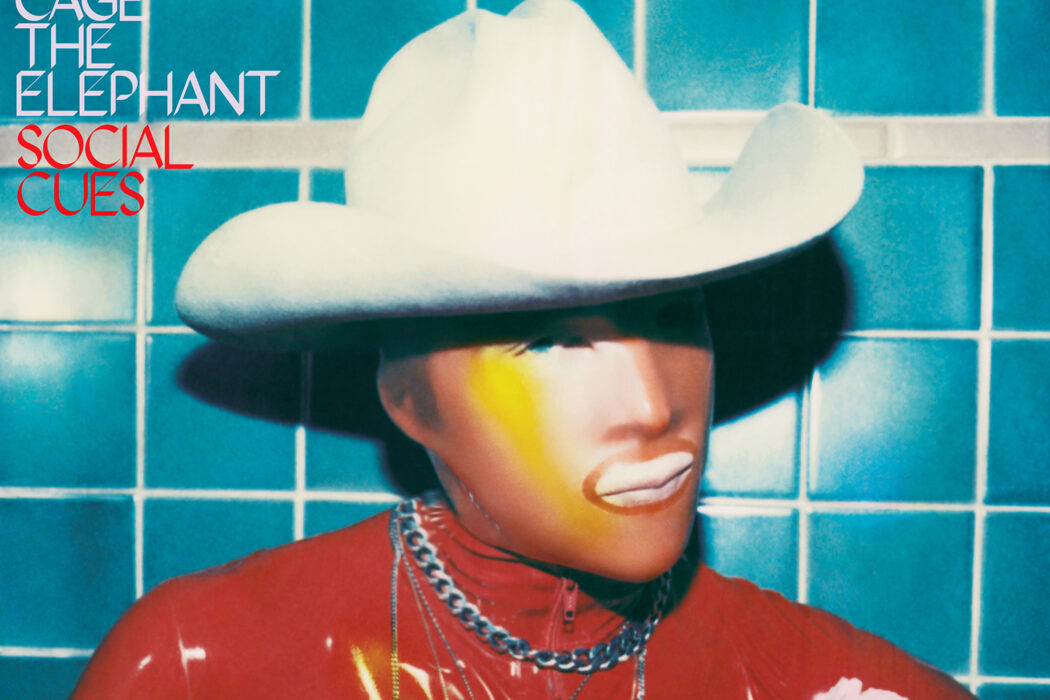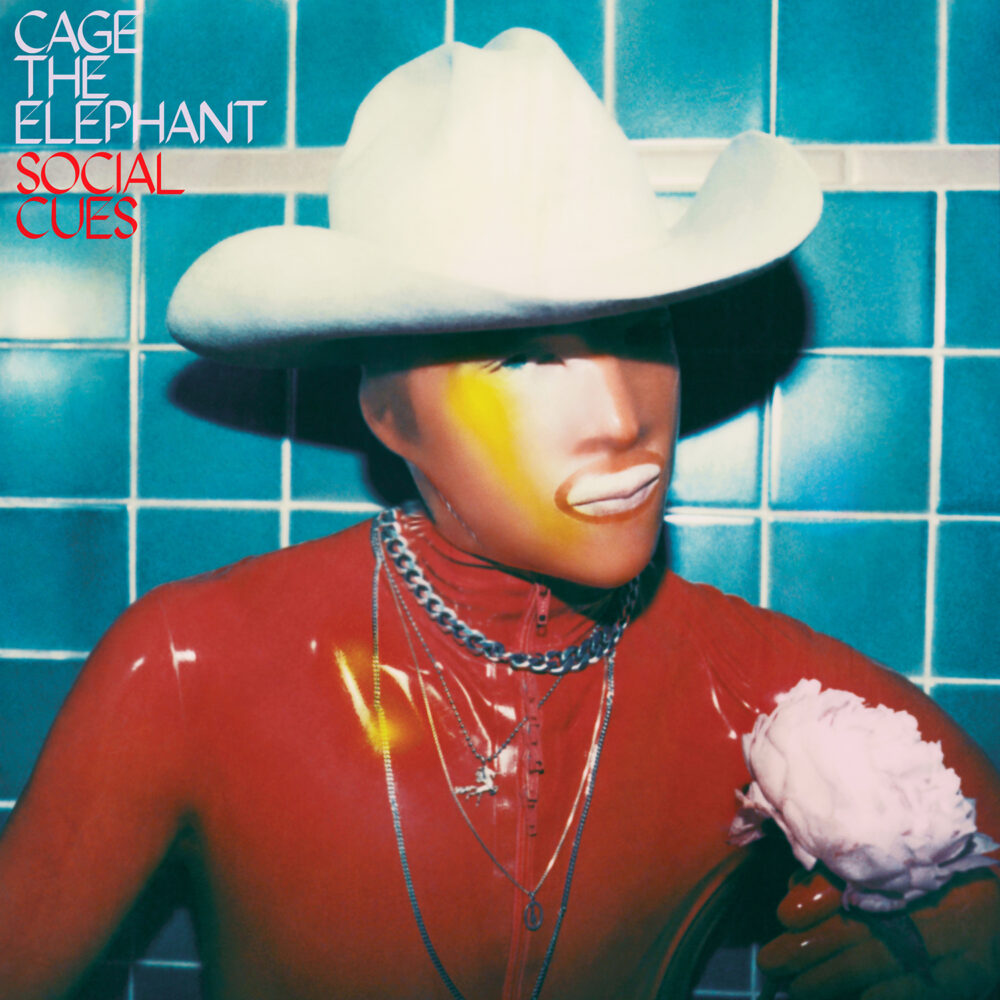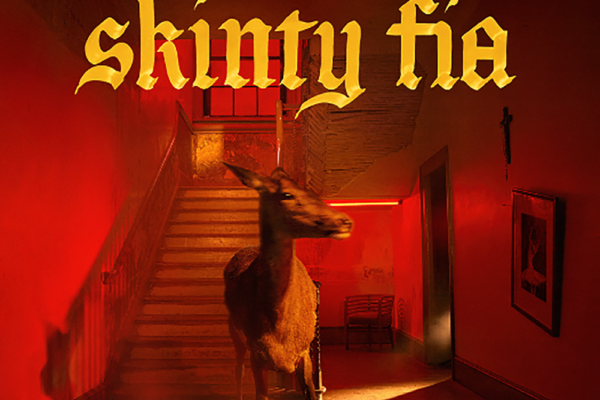The evolving album art is fascinating when you put Cage The Elephant’s new record, Social Cues – due for release tomorrow (April 19th) – side by side with their last studio album, 2015’s Tell Me I’m Pretty. Back then, the sleeve that held their latest work showed a young woman (a model named Rachel, in fact) staring straight back at you with an air of inattentive, unabashed confidence; a pure portrait on a plain background, with no makeup or distractions in sight. Conversely, their colorful new cover shows frontman Matt Shultz himself staring back from a skeptical angle, looking much more withdrawn and shrouded in a full costume – a white cowboy hat over a masochistic mask and red pleather bodysuit, his neck draped in chains as he clutches a large pink flower. As you might surmise from his somewhat strained expression, Social Cues centers on a tough personal subject: the end of his marriage, a seven-year relationship. There’s much to appreciate about Matt Shultz as an artist, but his dedication to creating new music during an agonizing struggle is a noteworthy gift to his fans – especially such lively and exciting new music, in spite of it all.
We were psyched to get an early peek at Social Cues (which can be found here tomorrow), and have no doubt that fellow fans will be savoring Shultz’ open lyrics and how his raw feelings unfold musically. The intense new studio album from the Bowling Green, Kentucky rockers, produced by John Hill (tUnE-yArDs, Florence + the Machine) is filled with era-blending, genre-surfing moments that are going to be fun to experience live. The much-loved band, formed in 2006 – comprised of Matt Shultz on vocals, his brother Brad Shultz on rhythm guitar, Nick Bockrath on lead guitar, Daniel Tichenor on bass, keyboardist Matthan Minster, and drummer Jared Champion – weren’t afraid to descend into darkness in Social Cues, but it’s an enjoyable and eclectic trip through all the pain. A terrific twist early on, “Night Running” is a slick reggae-steeped treat featuring none other than Beck, who rejuvenated the track after it sat in limbo for some time. After meeting him at an event, Cage The Elephant sent the track his way and within 24-48 hours, Beck had already added two rap verses and sent it back. That backstory is almost as cool as the fact that as a result, Beck and Cage the Elephant are touring together with Spoon and other special guests this summer (note to locals: they’re playing NY’s Forest Hills Stadium on 8/17, Holmdel, NJ on 8/20, and Camden, NJ on 8/21).
Shultz was watching Netflix’s I Am a Killer when he decided to start writing from the perspective of “this character: this soft-spoken, shy-eyed murderer” for Social Cues. And as his brother Brad recently revealed, Social Cues took musical cues from ‘80s horror films scored by John Carpenter, and also benefited from a collaboration with Beck’s father, composer David Campbell. Once you hear that old-school horror inspiration, you can’t un-hear it, particularly in the album’s opening tracks. First song “Broken Boy,” for just a few seconds, sounds as sullen and ragged as its title – until it slashes expectations with a hook that would have dominated radio waves four decades ago, yet feels really fresh today. Their titular second song, “Social Cues,” is brutally honest and exposed in the verses, but somehow drifts on air with a bright and shiny chorus that’s 100% Cage. They have a way of toying with contrast; the pop-tinged melody of “Black Madonna” saunters along serenely, all while the lyrics begin to dip into darker and more plaintive themes. There’s just as much contrast in Schultz’ tone and delivery; he seems slightly bitter and dismissive as he sings, “Call me when you’re ready to be real,” but his voice is honeyed as ever; sweet enough for a love song. Cage The Elephant were reportedly inspired by how Brian Jones played unconventional instruments on Rolling Stones classics like “Under My Thumb,” so listen for Mellotron on “Broken Boy” and pedal steel on “Black Madonna,” both of which were handled nicely by guitarist Nick Bockrath.
As Social Cues sinks into “Skin and Bones,” on which Matt Shultz sings, “It seems as if there’s no end in sight / I don’t want to be there when it all goes down…” the band maintains that heightened, popcorn-thriller momentum, even as things grow somber. “Ready To Let Go,” the first single they released, is a contender for catchiest groove – and comes with a wonderfully eerie and blood-drenched music video directed by Shultz, reflecting his feeling that “the truth is just scary as hell.” “House Of Glass,” one of the four singles they unveiled already, is marked by an awesome synth breakdown by Matthan Minster at the 2-minute mark, as well as Matt Shultz’ sticky chorus, “It’s an illusion, this admiration, of mutilation, my isolation;” easily one of the album’s most infectious hooks. In the very next song, they deliver a completely different vibe with “Love’s The Only Way,” a string-laden, ethereal ballad that hearkens back to Unpeeled, the live acoustic album Cage put out in 2017.
The journey to the end of the record moves from the mellow flow of “The War Is Over” to the fuzzy riffs of “Dance Dance,” the latter raising an important question: “Are we vibing, or just lying? Yeah we’re vibing,” Shultz confirms coolly in the chorus. “What I’m Becoming” shows off another fine use of strings that has David Campbell’s name written all over it, building a cinematic dreamscape for his Shultz’ apologetic lyrics. The penultimate track, “Tokyo Smoke,” holds the last dose of fun and some urban intensity, just before Social Cues reaches its poignant finale. The single they released most recently, “Goodbye” – for which they also shared the guitar tab, lyrics, and chords, encouraging the public to make their own version – was inspired by the work of John Lennon and written for Shultz’ wife as their relationship was coming to an end. It’s tough to hear as you emphasize with his sorrow, and as it turns out, it was even harder for him to get through in the studio; initially, he made it through just one take lying on the floor, then cancelled work for the next two weeks. But even as he navigates utter heartbreak in “Goodbye,” like many other moments on the record, Shultz’ gentle timbre is capable of comforting. It’s a bumpy ride to catharsis throughout Social Cues, and while we don’t necessarily escape the darkness, it feels good to have him driving.
Article: Olivia Isenhart





